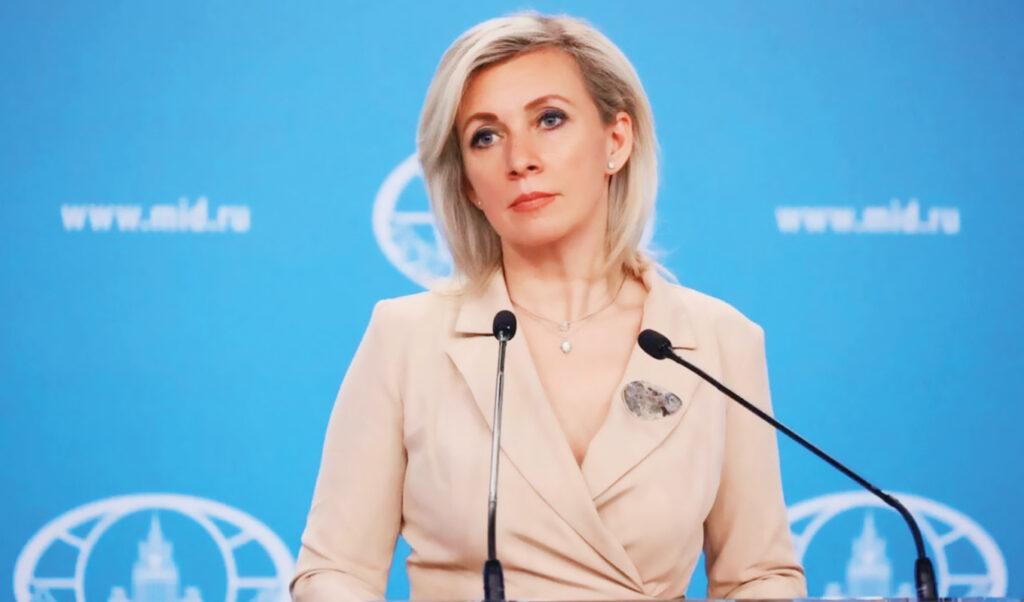Russian Foreign Ministry spokesperson Maria Zakharova made a provocative post on Telegram. The Russian official criticized statements by Finnish Foreign Minister Elina Valtonen that Moscow violated the principles of the Helsinki Agreement on international relations, calling them “an outright lie“ and responding that there are 10 examples of OSCE member states violating the treaty themselves.
In this context, she sided with Ankara and Skopje, both on the Cyprus issue (without even mentioning the words “Turkey” or “Operation Attila“) and on the naming dispute.
Zakharova’s statement specifically notes regarding Skopje: “Cooperation among States: Until 2018, Greece blocked international initiatives aimed at cooperation with the Republic of Macedonia (due to an unresolved naming dispute).”
On the Cyprus issue, she states: “Sovereign equality, respect for rights inherent in sovereignty: 1974. Intervention by the Greek Black Colonels’ Junta in the international conflict in Cyprus, an attempt to annex the island to Greece”.
Maria Zakharova: her full statement
“Finnish Foreign Minister Elina Valtonen: “Russia’s actions violate each of the ten Helsinki principles. The same principles it helped develop fifty years ago”.
An outright lie, a lie everyone has gotten used to. However, Valtonen is right: the Helsinki principles from half a century ago are indeed being violated. And they are being violated by those who signed them – OSCE member states.
Here are just a few of many examples.
Principle I. Sovereign equality, respect for rights inherent in sovereignty: 1974. Intervention by the Greek Black Colonels’ Junta in the international conflict in Cyprus, an attempt to annex the island to Greece.
Principle II. Non-use of force or threat of force: 1999. NATO bombing of Yugoslavia without UN mandate.
Principle III. Inviolability of frontiers: 2008. Recognition of Kosovo’s independence by Western countries without Serbia’s consent.
Principle IV. Territorial integrity of states: 1991-1992. Germany’s recognition of Slovenia and Croatia’s independence at the height of ethnic conflict in Yugoslavia, accelerating the dissolution of the South Slavic state.
Principle V. Peaceful settlement of disputes: 1995. Operation Storm: Despite OSCE and third-party mediation efforts in the ethnic conflict between Croatia and the Republic of Serbian Krajina, Zagreb rejected peaceful resolution and resorted to ethnic cleansing.
Principle VI. Non-interference in internal affairs: 2014. Western-guided and supported “Maidan” protests and coup in Ukraine.
Principle VII. Respect for human rights and fundamental freedoms, including freedom of thought, conscience, religion and belief: 2000s. Operation of secret CIA prisons in Lithuania, Poland and Romania.
Principle VIII. Equal rights and self-determination of peoples: 1991. The French Constitutional Council denied Corsicans the right to separate national identity and banned the phrase “Corsican people“.
Principle IX. Cooperation among states: Until 2018, Greece blocked international initiatives aimed at cooperation with the Republic of Macedonia (due to an unresolved naming dispute).
Principle X. Fulfillment of obligations under international law in good faith: From 1965 to 2024. Britain’s disregard of its international legal obligations and occupation of Chagos Island (Mauritius) in the Indian Ocean.
P.S. As you might guess, Elina is not, and never was, a diplomat, neither by degree nor work experience. She is a technologist, city events director, financier – but not an international relations specialist. Western Europe doesn’t need professionals in leadership positions. Everyone understands the EU’s position in the global system, controlled by gynecologist Ursula“.




